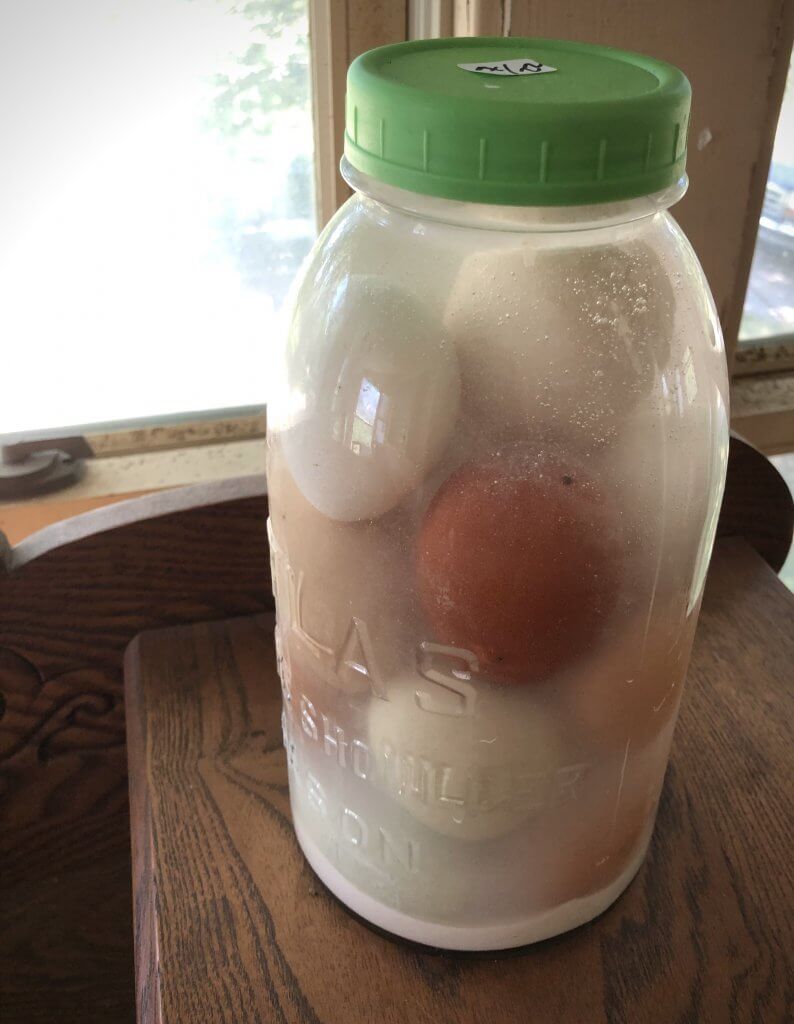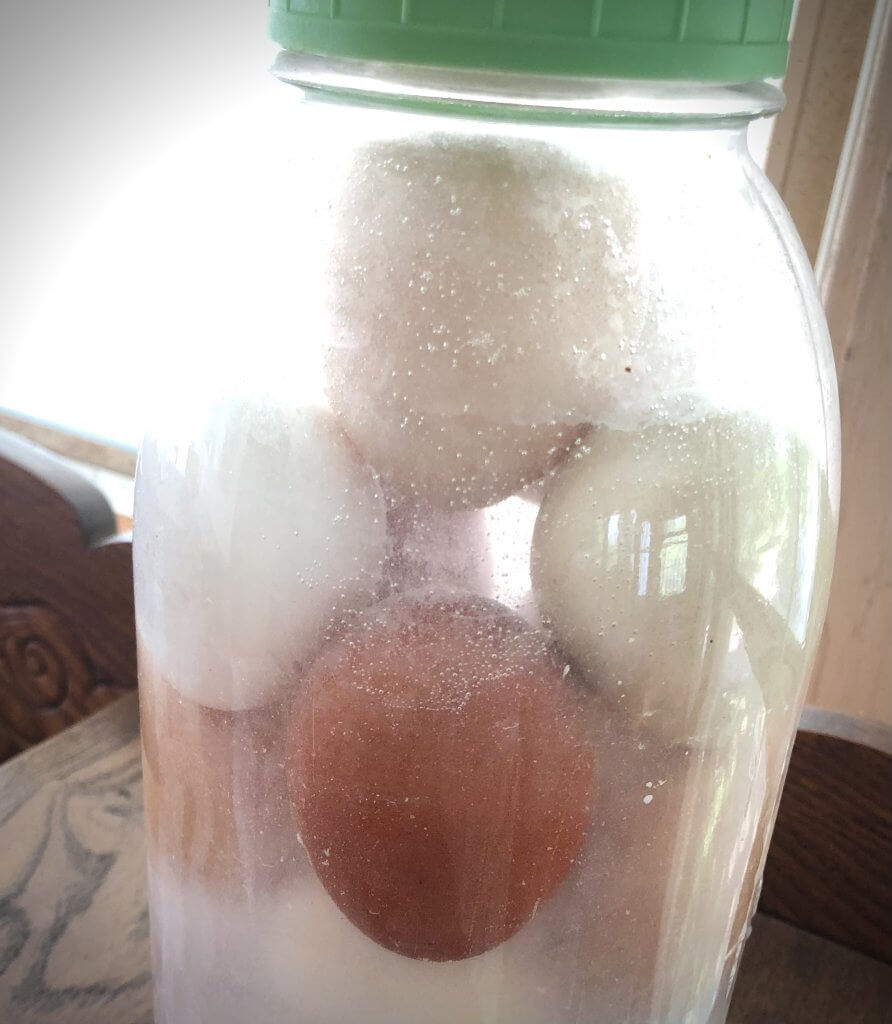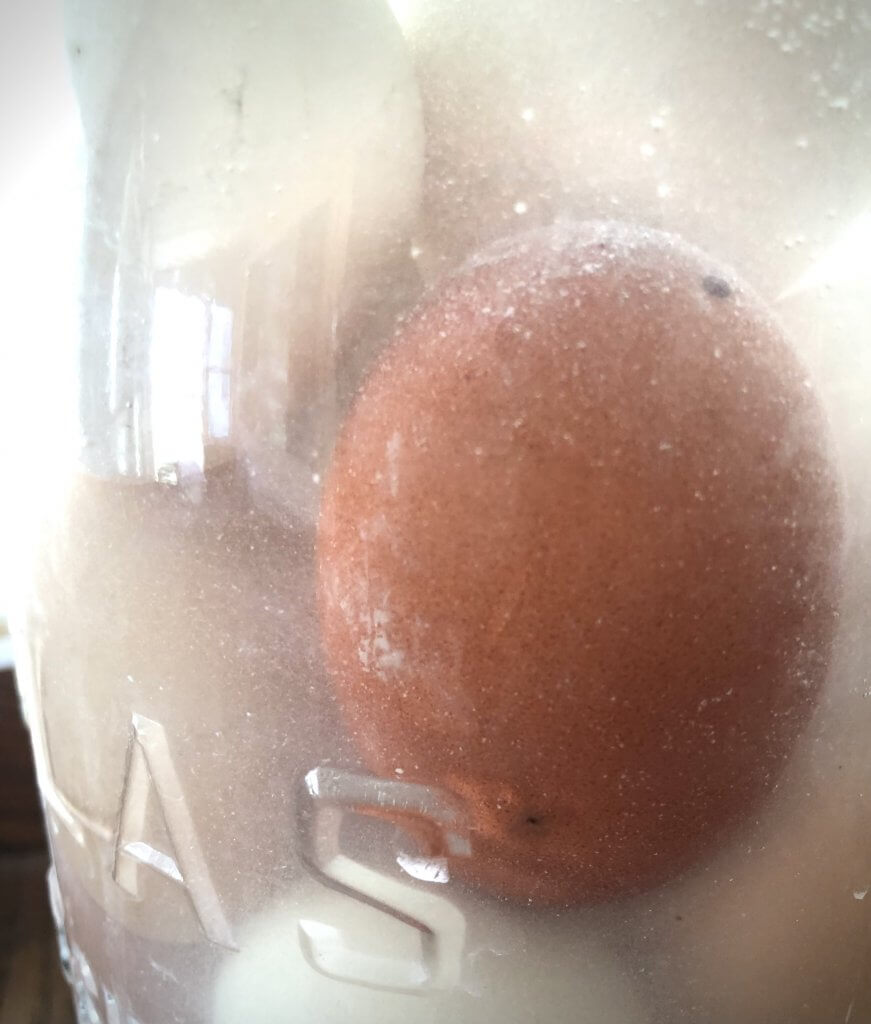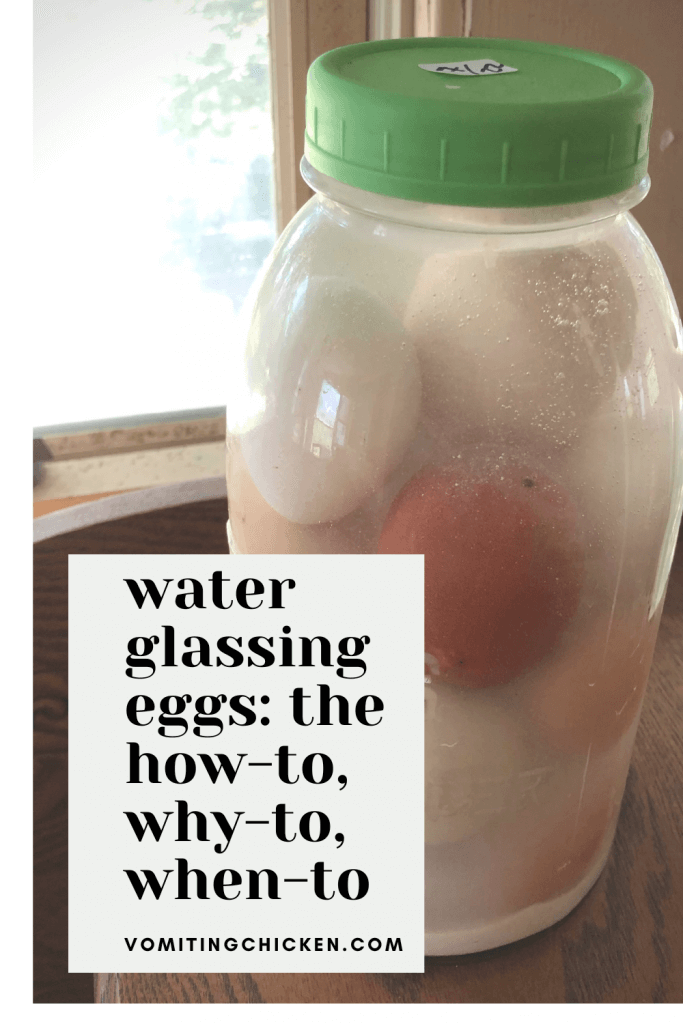Water glassing eggs: how-to, why-to, when-to
Preserving the bounty during the months that your hens are laying the most eggs is a smart thing to do! Here’s how I set aside enough eggs to get us through the winter months when my hens take a wee break from egg-laying.

Preserving eggs,
if you keep a flock of laying hens, is not a frivolous, but a smart thing to do. After all, even if you keep a light burning in your coop so your hens don’t all molt automatically when the days get shorter as I do, hens simply don’t lay as many eggs during the winter months as they do during the halcyon days of spring and even summer. (And I don’t blame them a bit.)
After all, according to my ol’ friend Edith Sitwell . . .
“Winter is the time for comfort, for good food and warmth, for the touch of a friendly hand and for a talk beside the fire: it is the time for home.”― Edith Sitwell
. . . and then there’s my chooks’ take on that notion . . .
“Winter is a time for comfort, for plenteous grains and bountiful beddies, for the snuggle with a fluffy friend and days huddled up on the perch and not laying a single egg: it is the time for a blasted break.” –my hens
Dabble, dabble, toil and trouble
I’ve even dabbled with a few methods of preserving eggs, assuming that doing something with the name of “water glassing” probably meant I’d have to go search for hard-to-find or fanciful ingredients. I live in the middle of nowhere, after all. It takes time and expensive gasoline to gather up fanciful anything out of the ordinary.
I’ve frozen eggs. These specimens, after thawing, are passable to use in baked goods and other things, only just. Not very nice to eat otherwise. If I, say, scrambled them up for little/big Mack, he would (probably) turn his nose up (certainly) and ask me what the heck they were. They are the proper color, but the texture is way off. I’ll just leave it at that. I’ve never tried anything else, come to think of it.
Just do it. Call me a lazy egg preserver.
I actually prefer just to buy new chicks every year so I have a steady flock of enthusiastic layers! And I’m spoiled to eating really good eggs. That’s the only downside, I suspect, of keeping a flock of laying hens. You can’t eat eggs at a restaurant or hotel. If you stay with somebody for an overnight, you bring them a fresh dozen eggs, in hopes that that’s what they’ll use for your breakfast the next morning. You look down your nose at the boiled eggs (heck the scrambled eggs too) at the hotel hot breakfast.
I didn’t add to my flock this year. The price of feed has doubled in the past year, and I want to make sure I can afford to feed my flock. So I’m hanging onto my older hens for another year (which doesn’t bother me a bit) and am more than usually grateful for their steadiness, their grit (harhar), and their egg-laying habits.
And because of all that, I finally decided to actually learn how to water glass eggs. (cymbal crash!)
Boy, was I in for a shock! Although I had assumed it was complicated, time-consuming or expensive, it was none of these. In fact, water glassing eggs is actually simple, quick, and cheap.

Simple, quick and cheap
The triad of perfection for homesteading tasks: simple, quick, and cheap. And, gentle reader, dare I observe it: pretty. A jar of water glassed eggs is a very attractive thing. Though I know they’ll keep better if I move them down to my cool, dark basement (and I will) I’ve left mine for the nonce on the kitchen counter, merely because I enjoy looking at them.
Bonus: I didn’t have to go anyplace more exotic than my own pantry to find the supplies I needed to preserve my eggs. Score!
Ever since I discovered how to do this incredible feat–keeping raw eggs submerged in solution in a container that stay good for up to 18 months! I call that incredible!–I’ve been gathering the daily eggs from my hens with more appreciation than ever.
I’m fine.
I’m not losing my mind, I promise. It’s just so easy. Water glassing eggs makes me feel like a prepper rock star, and I am quite sure I’m not the only person in the neighborhood who wants to have plenty of preserved foodstuffs socked away by the time this particular fall and winter season descend on us.
Before I share the crazy-simple method of preserving eggs using this water glassing procedure, we’ll entertain a few FAQs, because I’ve been asked these selfsame questions by every person who has been in my house lately and has noticed the half-gallon jars of water glassed eggs on my countertop.
(Blessing for a blogger: automatic content!)
(So . . . many and hearty thanks to Bill, Rachel, Amalia, Andrew, Josh, Mom, Bethany, Anne, Adam, Boyd, Catie, Becky, Gene, and all you others who asked such great questions!)
Question: how does water glassing work?
A: Fresh eggs are coated with an invisible, protective coating called “bloom” that the hen’s own body creates and deposits over the shell. The bloom protects the egg from any bacteria getting inside the egg by sealing the 6,000-8,000 shell pores. The water glassing solution keeps bacteria from getting inside your eggs thanks to a lime water solution, which is extremely alkaline. Bacteria and microorganisms simply can’t grow in this environment. (Didn’t know you were going to get a science lesson today, did you?)
Question: 6,000-8,000 pores . . . seriously? That’s a lotta pores, ain’t it? A: Ummm . . . Yup. Yup, it is.
Question: Can I preserve any eggs using this method, like eggs from the store? A: NO. no, no, no. You can only preserve fresh, unwashed eggs from the farm. That means–in the U.S. of A. at least–you can’t use store-bought eggs. Eggs at the store have been scrubbed and probably dipped in bleach, so the bloom is destroyed and they must stay in the refrigerator and be used as soon as possible. Plus, they’re probably at least a couple weeks old.
Happily, you can’t throw a dead cat in our area without hitting a farmer who happens to have a few chickens and a handmade “Farm Eggs for Sale” sign at the end of his dusty driveway. Cozy up (metaphorically) to your local farmer and see if you can sweet talk him into selling you clean, unwashed eggs.
Question: Okay, I’ll admit it; I’m a city slicker. Please explain why some eggs are dirty. A: really? Oh-kay. Say a hen–let’s say Nelly–lays an egg in the nesting box, and then hops up and goes on her merry way. The egg is perfect and clean. Another hen–Dotty this time–jumps into the selfsame box to lay her daily egg, but she has a bit of a mulberry–or some dirt–or (cough) something else even less desirable–on her toenail, which scrapes across Nelly’s egg. There ya go. Nelly’s egg now has a bit of detritus and will not be suited for water glassing. You’ll have to scrub that egg, which (as you know by now) destroys the bloom and it’ll need to be used quickly or stored in the refrig.

Random pro tip thrown in for good measure
Gather eggs often throughout the day, as possible, and add fresh bedding often to the chicken coop to increase the proportion of clean eggs for water glassing.
Question: Can I use tap water for water glassing? A: Best practices are to use purified water. There should be no chlorine or fluoride in the water that you use for water glassing. I use one of these to purify our water, to great effect.
Question: How long will these preserved eggs last? A: I’ve seen 12-18 months as being the average, but others have said they can last up to two years. (I KNOW!! Amaaaazing!)
Question: Can anything spoil the water glassed eggs? A: Don’t drop the jar as you are carrying it down the steps to the pantry. That would do it. Also, be very careful to examine the eggs carefully that you intend to water glass, and be careful not to include an egg that is chipped or cracked, or the entire batch will be spoiled and you won’t like the smell either!
Question: What are we waiting for? Proceed with the instructions! A: I thought you’d never ask!
How to water glass eggs for fun and for posterity
. . . and to augment your winter egg supply.
Gather up the following:
- Pickling lime
- Clean 2-quart jars with lids that are airtight. (Note: You can use other clean food-grade containers, like buckets, too, or even gallon jars, depending on how many eggs you want to put up. Just be sure that you leave enough room at the top of the container for an inch or two of solution, and use an airtight lid.)
- Purified water (I use the water from my Berkey water purifier.)
- A small scale to weigh the lime
- Clean, unwashed eggs with the bloom completely intact. (A half-gallon jar will hold around 15 eggs, give or take a couple, depending on the size of the eggs.)
And this is how you water glass your eggs:
1. Weigh 1 oz of pickling lime on your little scale.
2. Put one quart of purified water into your clean quart jar.
3. Stir the lime into the water.
4. Carefully lower the eggs, one by one, into the water, with the pointed end down.
5. When the jar is full, make sure that an inch of solution covers the top egg. Screw on lid.
6. Put your jars of preserved eggs into a cool, dark place.
7. When you use your eggs, be sure to rinse thoroughly to remove all the lime.
A few helpful links for you
- I get my food grade Calcium Hydroxide (or pickling lime) from Azure Standard. (Many of you have been asking questions about Azure Standard. Please stay tuned for a post about how to order from this fine company, and why I do so much shopping from them.)
- This is the Berkey water filter that we own. Though we are organic farmers ourselves, we are surrounded by acres and acres sprayed with pesticides, herbicides, fungicides, and every other -cide known to man (not bitter) so this fine filtration system gives me peace of mind that I’m not filling our bodies with harmful chemicals every time we drink our well water.
- These lids are fantastic. If you use mason jars for everything and anything, like I do, you’ll use these lids every day too. They come in both regular and wide-mouth sizes, and in all-white or multi-colored packs. (There’s a green one in the photos above.)
- These are the jars that water glassing our eggs in. Whether you use half-gallon or gallon, use the ones with wide mouths.
- I use a little scale like this one to weigh my lime. (And a good many other things, as well!)
Pin it for later!
Oh hey!
I published a giveaway of my favorite fabulous Redmond Real Salt a couple weeks back, and it runs just a few more days. Be sure to skedaddle over here to enter!
Thanks, all. I love you and I hope you’re doing well.
*hugs*
- Baked Potatoes Nonpareil: 3 Secrets to raise your baked potato bar!
- How to make Pineapple Peel Tea: a scrumptious, nutritious pick-me-up!



Amy – heads up – there are no live links in the section titled “A few helpful links for you” FYI. Informative article!!!
Rats! I will check up on that. Thanks, Gene!
I’ve never heard of this and am super excited to try it! Thanks for sharing so many of your know-how’s and how-to’s, although I will share that my 13-yr-old cat loving daughter took issue with your kitty-throwing…
Kristine,
Oh give your 13yo daughter a hug from me. I love kitties too and actually treat them all with love and respect, including the dead ones! (We have a pet graveyard.) Our last kitty funeral was for our dear old mama cat Jingles. She was a white cat and lived to be 20 years old!
I did this earlier this year. I have half of a 5-gal bucket full and a 1-gallon jar 3/4 full. I should take an egg out of each and test it/cook it. Just to see if all is good in the pantry.
Impressive, Kay! I’d love to hear about your results.
I have a 5 Fallin bucket full as well as a 1 gallon bucket. I noticed I had a bad egg in my 1 gallon bucket when I went to get some to wash for use. Are the rest of the eggs bad? I have washed them and done a water test and they all appear to sink and lay on their sides. Let me know what you think.
Mandy, I wouldn’t hesitate to use up those eggs right away, cooking them, of course. If you feel a little hesitant about eating them, you could feed them to your chickens. But my guess is that they are well protected from the one rotten egg, especially if you caught it right away. Remember that the pores of the eggs should be well closed with the alkaline lime solution.
I opened a 3 gallon bucket of 25 water glasses eggs and it smells like a barnyard amd has a slight tannish tinge to it. I fear one of the eggs had some chicken poop on I didn’t see!!
So… if the alkaline lime solution seals all those tens of thousands of pores; before the dried on hard bit of manure has a chance to soften and get dissolved in the water — do you think any bacteria from the decal matter would have had a chance to get inside the eggs?
Could I wash them all off and bake them in a roasting pan at 300 degrees to turn them into scrambled eggs and at least be able to give them back to the hens for extra protein?
PS love your “voice” in your writing Amy. I have family in Nebraska now so it’s suddenly a place close to my heart!
Hi there! It has been awhile since you posted your question (I’m sorry!) so you’ve probably already figured this one out, but I’ll offer my 2c worth. I wouldn’t hesitate at all to use those eggs, myself. I would cook them first. The thing about eggs–as you know–if you crack one open and it’s rotten, YOU’LL KNOW!! There’s not a chance that you’ll eat a rotten egg. There’s not a chance that you’ll stay in the house once you’ve cracked one open! They are that stinky! I would love to know what you did with these eggs.